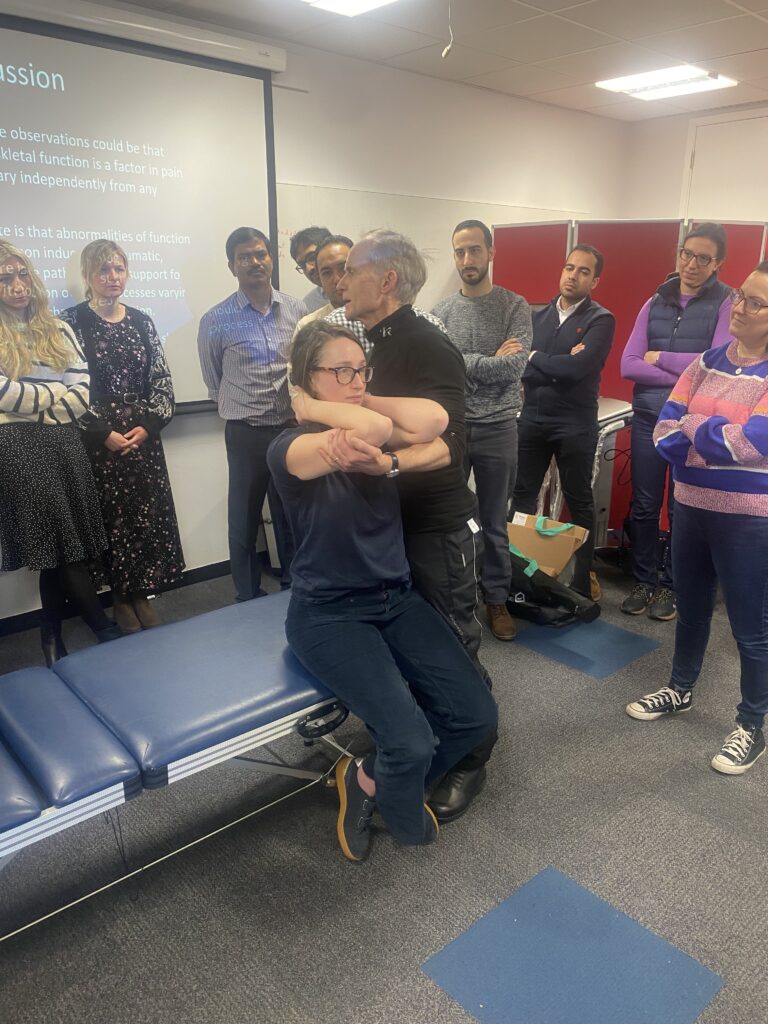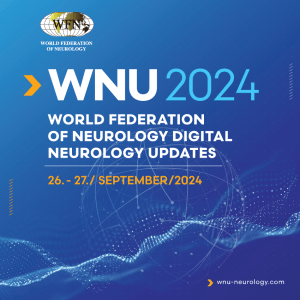The National Musculoskeletal and Pain Medicine Course organised by the University of Leeds and the British Society of Physical and Rehabilitation Medicine (BSPRM) was the first face-to-face course organised by the society post-pandemic. It was held at the University of Leeds, UK between the 8th and 10th of February 2023. The multi-speciality nature of musculoskeletal (MSK) medicine meant that experts in clinical and research aspects of MSK and rehabilitation were naturally attracted to the course both as attendees and as presenters. It focused extensively and effectively on the theoretical bases of MSK and Pain Medicine combined with practical workshops aiming at developing the skills of trainees and clinicians.
The course was formally opened with a welcome address by Professor Rory O’Connor, Professor in Rehabilitation Medicine in Leeds and Dr Manoj Sivan, the President of BSPRM and Associate Clinical Professor in Rehabilitation Medicine. They explained the relevance and significance of MSK competencies in Rehabilitation Medicine practice and other relevant specialties in the UK and internationally.
Presentations on the first day were divided according to regional anatomy. Dr Marwan Al-Dawud, a Sports and Exercise Medicine Physician with a special interest in Tendinopathies and MSK ultrasound and intervention therapy discussed the applied anatomy of the shoulder, its common pathologies and rehabilitation principles. Following this, Dr Piera Santullo, a Rehabilitation Medicine Consultant at Nottingham University Hospitals NHS Trust, UK, delivered a presentation on the applied anatomy, common pathologies and rehabilitation principles of the elbow. Conditions such as carpal tunnel syndrome, de Quervain’s tenosynovitis and other hand and wrist pathologies were discussed by Dr Richard Wakefield, a Senior Lecturer in Rheumatology in Leeds with special interest in MSK ultrasound and ultrasound guided injections.
Participants felt rejuvenated and refreshed following a tea break, consequently making the time well suited for the practical workshops on anatomic and ultrasound techniques for diagnoses and interventions in pathologies of soft tissues and joints of the upper limbs. The workshop session was very practical, hands-on, extremely inspiring and timely for clinicians and trainees. It could have been prolonged because of the interest and enthusiasm of participants had the lunch not arrived, bringing the morning session to an end.

The afternoon session focused on lower limb conditions. Dr Javvad Haider, Consultant Rehabilitation Medicine Physician in Cardiff did justice to relevant anatomy, MSK pathology and rehabilitation management of the hip joint. Next were conditions relating to the knee, ankle and foot, presented in a very simplified and interactive manner by Dr Samuel Thistleton, Consultant in Sports and Exercise Medicine. These theoretical sessions were followed by very educational practical ultrasound sessions on lower limb structures by the speakers. Dr Gui Tran, a Rheumatologist with an interest in MSK Medicine, delivered an interesting interactive session on inflammatory and autoimmune conditions including gout, rheumatoid arthritis, and polymyalgia rheumatica.
The second day started with another presentation by Dr Haider on applied anatomy, common conditions and rehabilitation principles in management of the spine. This presentation focused on biomechanics in general and how it affects the spine. Spinal segmental/somatic dysfunction and a practical workshop on how to examine for it was another excellent highlight of the second day, delivered by Dr Martyn Speight, a foremost and renowned expert in medical osteopathy, and Musculoskeletal & Sports Physician.
After a tea break, Dr John Titterington, Consultant in Pain Medicine at Leeds Teaching Hospital delivered a presentation on percutaneous interventional injections for radiculopathy such as caudal blocks, selective nerve blocks, nucleoplasty and the use of an implantable stimulator. Osteoporosis was succinctly presented by Dr Sunil Nedungayil, a General Practitioner with special interest in MSK, and Associate Medical Director in the Northern Bone Health project. Following this, Dr Ece Yilmaz-Kara, Consultant in Physical and Rehabilitation Medicine in Reading, UK, discussed soft tissue release techniques relevant to MSK and rehabilitation medicine along with a hands-on session on acupuncture needles in dry needling techniques and trigger point injections. Dr Moheb Gaid, Consultant in Rehabilitation Medicine, shared his extensive experience and expertise on the use of diagnostic/therapeutic nerve blocks in complex spasticity management.
In the afternoon session, delegates attended a magnificent motion analysis laboratory in the University of Leeds Faculty of Biological Sciences where Sarah Astill, Associate Professor in Motion control along with her PhD students welcomed participants to the afternoon session. Dr Kitty Tang, a clinical scientist in Leeds Teaching Hospitals NHS Trust, discussed the basics of motion analysis, kinematics, and its relevance to neurological conditions. The description of the second day wouldn’t be complete without mentioning the evening social event. Delegates and organisers were treated to a nice dinner which further facilitated networking and socialisation, much needed after the pandemic.
The third day began on an aerobic mode, with Exercise Prescription discussed by Dr Ai Lyn Tan, Associate Professor in Rheumatology and Director of Research and Innovation at Leeds. Participants were also signposted to beneficial sites including Moving Medicine, Versus Arthritis, Park Run Practice and the use of the FITT and ABC principles of exercise prescription. Dr Manoj Sivan discussed the pathophysiology of pain and the approach to management of acute and chronic pain. This served as a very good prelude to the topic presented by Dr Jo Corrado, ST5 Rehabilitation Medicine Trainee in Leeds, who discussed Chronic Fatigue Syndrome and Fibromyalgia, explaining the commonalities, exploring dysautonomia and its role in these conditions and possibly in Long COVID based on her research experience.
After the tea break, Dr Sheila Black, Consultant in Pain Medicine and Regional adviser for Pain Medicine in Yorkshire, UK, delivered a comprehensive presentation on neuromodulation. Dr Rohit Bhide, Consultant in Spinal Injuries and Amputee & Prosthetics Rehabilitation at Sheffield Teaching Hospitals NHS Foundation Trust, delivered a talk on a structured pathway for pain management in amputee patients with focus on neuroma management. The delegates then had ample time for more hands-on revision sessions on ultrasound techniques. The last session for the course was the icing on the cake. Dr Abayomi Salawu, Consultant in Rehabilitation Medicine at Hull University Teaching Hospital and Honorary Reader with Hull/York Medical School, discussed the topic ‘skeletal muscle as an endocrine organ’. He explored the basic physiology of skeletal muscle and its clinical relevance. He ended the talk by discussing ‘Exercise is Medicine,’ emphasising the danger of physical inactivity to our patients and the global economy.
Dr Sivan and the faculty thanked all delegates and organisers for attending and making the course a huge success with positive feedback throughout the 3 days. They spoke about encouraging new brains to further MSK and pain rehabilitation in the UK and internationally, while urging trainees to engage in hands-on practice and integrate MSK into every aspect of rehabilitation medicine practice. Course group pictures were taken, and delegates departed feeling very fulfilled.

